Atheistic China And Racism
 From Conservapedia
From Conservapedia China has the world's largest atheist population.[2][3] China has state atheism (see: China and atheism).
East Asia contains about 25 percent of the world’s population. China’s population represents 20 percent of the people on earth.[4]
Razib Khan points out in Discover Magazine, "most secular nations in the world are those of East Asia, in particular what are often termed “Confucian societies.” It is likely therefore that the majority of the world’s atheists are actually East Asian."[5] See: Asian atheism and Global atheism
Contents
- 1 China's state atheism
- 2 Atheistic China and racism
- 3 China: UN Committee on the Elimination of Racial Discrimination calls for probe into Xinjiang rights violations by the Peoples’ Republic of China
- 4 Atheistic China: Covid-19 Discrimination Against Africans
- 5 Blackface on Chinese state broadcaster CCTV
- 6 See also
- 7 References
China's state atheism[edit]
See: Atheism and China
In 1955, Chinese Communist leader Zhou Enlai declared, "We Communists are atheists".[6] In 2014, the Communist Party of China reaffirmed that members of their party must be atheists.[7] See also: Atheism and communism and China and atheism
In 2016, the International Business Times reported: "A senior Chinese advisor on religious affairs has said the country should promote atheism throughout society, in remarks that appear to reflect a deepening campaign to reinforce traditional Marxist values in China — and could add to concern about official attitudes among believers in the country’s five officially recognized religions."[8]
In 2014, the New American website indicated:
| “ | The Communist Party of China (CPC) is letting its members know that the party’s official adherence to militant atheism has not changed; Party members are not allowed to be Christians, or to hold any other religious beliefs. That is the clear message sent by a top Party official in an editorial published on November 14 in the Global Times, the international version of People’s Daily, the official newspaper and mouthpiece of the CPC.[9] | ” |
According to the BBC:
| “ | At the end of the Chinese Communist Party's 19th Congress, the new Politburo Standing Committee was revealed: seven middle aged men in dark suits, without a woman to be seen. There has never been a female member of the Standing Committee.
Of the 2,280 delegates at that Congress, fewer than a quarter were women. That's got some people asking whether the party should take gender equality more seriously. The New York Times wrote of women being "shut out" - but does the Chinese Communist Party have a woman problem? Of the 89.4 million members of the Chinese Communist Party, just under 23 million are women - that's 26%. And women make up 24% of China's National Congress - the sprawling national parliament. You don't have to be a Communist Party member to sit on that.[10] |
” |
Atheistic China and racism[edit]
Leroy Adams writes in an article entitled What is it like to be Black in China?:
| “ | China is a country plagued by racism.
To be Black or African in China is to be labeled unintelligent, dangerous, unattractive, or to see an empty seat next to you on a crowded subway.[11] |
” |
Barry Sautman published via the Cambridge University Press about racism in post Mao Zedong China:
| “ | Expressions of anti-black sentiment by Chinese students have caught the world's attention periodically since the end of the 1970s. Demonstrations against African students in Nanjing and other cities between late 1988 and early 1989 received wide press coverage. Because the African population in China is small and transient, some observers saw these events as a manifestation of a vestigial xenophobia, not as part of a developing trend of thought within a key segment of Chinese society. Placed next to the brutal ethnic conflicts that plague much of the world, the episodic, non-lethal incidents in China seemed evanescent, with only fleeting implications for China's foreign policy.[12] | ” |
An article entitled Racism in China declares:
| “ | The Han Chinese have traditionally considered themselves more advanced and civilized than other ethnic groups in China. In the imperial era, this was almost state policy. The sentiment continues today even though laws have been enacted to protect minorities, racism is officially condemned and Chinese multi-ethnicity is celebrated in propaganda. In recent years assimilation has been encouraged, particularly in Tibet and Xinjiang, whose ethnic groups are regarded as a threat.
The Chinese have many prejudiced views about race, gender and nationality. Chinese often have no compunctions about directly mocking ethnic minorities, and there sometimes seems to be a prevailing belief that anything non-Chinese is primitive. Throughout most of their history, the Chinese have regarded anyone who lives outside of China as a savage or a barbarian. Europeans, for example, were thought to have more hair than monkeys, larger noses than anteaters and a smell more awful than dead bodies. The Chinese believed some white people tied themselves together to keep from being snatched away by eagles and other had holes in chests so the they could be carried by poles. According to one account some towns in Europe were composed entirely of women who became pregnant by staring at their shadows. Chinese have also been victims of racism. In World War II, Chinese-Americans were not allowed to become pilots because it was believed that their slanted eyes prevented them from seeing well enough to fly a plane.[13] |
” |
The Internations organization website declares concerning racism in China:
| “ | When it comes to foreign nations against which racism in China exists, the Japanese are particularly disliked. The use of slurs, such as “little Japanese” and even “Japanese devils”, is fairly common. The two countries’ bloody history — particularly Japan’s occupation of China and the atrocities against Chinese citizens during World War II — is neither forgotten nor forgiven. According to a BBC World Service poll, nine out of ten Chinese think negatively of their island neighbors.
Black people are often regarded suspiciously, too, and considered as all coming from Africa, regardless of their actual origin. In a society where light skin is still deemed desirable and seen as a sign of fortune, darker skin is often associated with less favorable traits. There have, for instance, been reports of African-American English teachers (and thus native speakers) being turned down in favor of white English teachers with non-native language skills. China’s economic investment in a number of African countries may well have helped to create the prejudice that all Africans are poor and profiting from money that should rather be invested at home, thus fostering racism in China. In Guangzhou, where a large number of Africans have settled over the last few years, racial tensions have been particularly high. Typically, however, racism in China is more common in remote areas than in the big cities with a large number of foreign residents. China’s long isolation from the rest of the world has also helped to foster stereotypes. However, with the opening up of the country and especially the younger generation’s increasing contact with foreign cultures (e.g. basketball is now immensely popular in China), some of these negative stereotypes will hopefully disperse soon. Until then, while discrimination and racism in China do prevail, they are at least non-violent in the vast majority of cases.[14] |
” |
China: UN Committee on the Elimination of Racial Discrimination calls for probe into Xinjiang rights violations by the Peoples’ Republic of China[edit]
See also: Atheism and human rights and Atheism and human rights violations
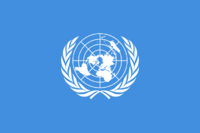
According the United Nations website:
| “ | The UN Committee on the Elimination of Racial Discrimination (CERD) today called on the Peoples’ Republic of China to immediately investigate all allegations of human rights violations in the Xinjiang Uyghur Autonomous Region (XUAR), including those of torture, ill-treatment, sexual violence, forced labour, enforced disappearances and deaths in custody.
Acting under its early warning and urgent action procedure, the Committee also called on China to immediately release all individuals arbitrarily deprived of their liberty in the XUAR, whether in so-called Vocational Education and Training Centres (VETCs) or other detention facilities, and to provide relatives of those detained or disappeared with detailed information about their status and well-being. The Committee further:
|
” |
The Business Standard website indicated in 2022: The United Nations "urged the State party to effectively implement its 2018 recommendations, as well as the 2015 Concluding Observations of the Committee against Torture, and the UN Human Rights Office's assessment of human rights concerns in XUAR of August 2022."[16]
Atheistic China: Covid-19 Discrimination Against Africans[edit]
See also: Atheism and the coronavirus pandemic and Internet atheism and the coronavirus pandemic

See: Atheism and the coronavirus pandemic
The Human Rights Watch website notes:
| “ | The Chinese government should end the discriminatory treatment of Africans related to the Covid-19 pandemic, Human Rights Watch said today. Authorities should also protect Africans and people of African descent throughout China from discrimination in employment, housing, and other realms.
In early April 2020, Chinese authorities in the southern city of Guangzhou, Guangdong province, which has China’s largest African community, began a campaign to forcibly test Africans for the coronavirus, and ordered them to self-isolate or to quarantine in designated hotels. Landlords then evicted African residents, forcing many to sleep on the street, and hotels, shops, and restaurants refused African customers. Other foreign groups have generally not been subjected to similar treatment. “Chinese authorities claim ‘zero tolerance’ for discrimination, but what they are doing to Africans in Guangzhou is a textbook case of just that,” said Yaqiu Wang, China researcher at Human Rights Watch. “Beijing should immediately investigate and hold accountable all officials and others responsible for discriminatory treatment.” On April 12, Guangdong authorities announced that all foreigners in the province must accept “Covid-19 prevention and containment measures” including “testing, sampling and quarantine.” In practice, the authorities just targeted Africans for forced testing and quarantine. They visited homes of African residents, testing them on the spot or instructing them to take a test at a hospital. Some were ordered to self-isolate at home with surveillance cameras or alarms installed outside of their apartments.[17] |
” |
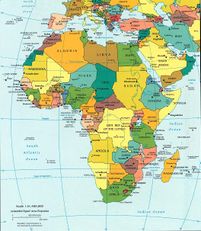
The Brookings Institution notes:
| “ | In the midst of the global scramble to deal with the COVID-19 crisis, relations have ruptured at a most unexpected front—between China and Africa. Since April 8, reports and social media discussions about the eviction and maltreatment of Africans in the Chinese city of Guangzhou have gone viral, leading to a series of formal and official diplomatic protests from the African Union and African countries toward China. Never before had the two sides had such a critical, high-profile, and widespread clash of positions, let alone allowed it to erupt in front of the public. Given China’s relentless efforts to consolidate ties and enhance engagement with Africa (including sending medical equipment and doctors to the continent during this crisis), this racism and discrimination against African migrants and residents is both shocking to the world and damaging for China’s policy agenda.
The discrimination and maltreatment the African nationals have suffered are the direct result of the rising pressure from the imported cases of COVID-19 faced by the authorities of Guangzhou. On March 28, China officially imposed an entry ban on all foreign nationals with visas or residence permits in an attempt to curb the rising number of imported cases after the country managed to control the domestic infection. As a part of these measures, Chinese airlines are only allowed to operate one route per week to any specific country, primarily to bring back overseas Chinese who wish to return. As the imported cases became the biggest challenge to China’s battle against COVID-19, foreign nationals who arrived in China before March 28 quickly became the center of attention. In particular, the central government put great pressure on all local cities to minimize the number of imported cases. Guangzhou, the home to Asia’s largest African migrant population, suddenly became the front line of China’s renewed battle with COVID-19.[19] |
” |
The abstract for the journal article #ChinaMustexplain: Global Tweets, COVID-19, and Anti-Black Racism in China published in the peer-reviewed journal Review of Black Political Economy states:
| “ | One of the consequences of the emergence of COVID-19 has been the glaring racial and ethnic disparities that have defined the course of the spread of the virus. As a recent migrant-minority community in China, the Black community’s experience has been defined by vulgar racism, exploitation, and stigmatization. In the context of COVID-19, the Black community in China was again a target of multiple racial projects which sought to label their bodies as diseased and physical presence as a threat to the viability and safety of the Han majority. The global response was to mobilize online to expose how the Chinese government is systematically facilitating discriminatory policies against Black migrants in China. In the present paper, we explore how Twitter was utilized to mobilize awareness about anti-Black racism in China. We first present a brief history of African migration to China and then discuss the Han racial ideologies that are inspiring the anti-Black racism. We then use latent Dirichlet allocation as a topic modeling algorithm to extract underlying themes to discuss how anti-Black racism in the COVID-19 context was framed and subsequently challenged by the global community. Finally, we conclude with a brief discussion on COVID-19 and the future of the Black community in China.[20] | ” |

In 2005, there were four times as many non-Western World Christians as there were Western World Christians.[21]
The Guardian noted:
| “ | African people continue to be barred from hotels, shops and restaurants in Guangzhou, despite Chinese officials assuring governments across Africa that discrimination resulting from efforts to contain the coronavirus outbreak would stop.
Racist discrimination in Guangzhou earlier this month caused outrage in Africa, provoking rare official protests to China by several countries. Africans in the city who were contacted recently by the Guardian said they still faced hostility and racism, prompted by fears they may be carriers of Covid-19. Frank Nnabugwu, a Nigerian businessman who has lived in Guangzhou for a year, said he was not allowed to return to his rented accommodation last week after being released from two weeks’ quarantine. “The security guards said to us: ‘No foreigners are allowed’. I was upset, very upset. I slept on the street,” the 30-year-old said. Police eventually found a hotel willing to rent Nnabugwu a room. “We use the receptionist to order food,” Nnabugwu said. “If they [food delivery companies] know it is a foreigner ordering food they will not come. You cannot buy anything in a shop; if you go in they will cover their face and chase you out... Roberto Castillo, an assistant professor at Lingnan University in Hong Kong who has been researching the African presence in China, said: “Unsurprisingly, China’s response was to deflect and spin the narrative as yet another situation distorted by western media and fake news, and to point out that China does not discriminate against any foreigners.” China has made massive strides in its political, commercial and cultural presence in Africa in recent years and launched a diplomatic offensive at the beginning of the pandemic. The row over racism threatens some of these gains. “The images of black people sleeping under bridges, families with children being evicted from their legally rented places of abode, as well as entrance and service denial to blacks, were seen by many as Chinese racism and as a Chinese betrayal of African solidarity in these difficult times,” said Castillo.[22] |
” |
Blackface on Chinese state broadcaster CCTV[edit]
Human Rights Watch reported in 2021:
| “ | High-profile blackface scandals typically produce public embarrassment, apologies and promises of self-reflection — but not when the Chinese government is responsible. That's what we saw last week on the eve of the Lunar New Year, when the Chinese state broadcaster CCTV televised its annual live variety show, which draws hundreds of millions of viewers, featuring dancers in blackface.
For those who think the official line from Beijing is bad, check out the Chinese internet, where the rampant racism against Black people is often too appalling to repeat. This performative use of blackface belies a rampant racism problem in the country, which comes on the heels of growing discrimination against Black people and Africans by the Chinese government, which appears to be compounded by the pandemic.[24] |
” |
See also[edit]
- Atheism and racism
- Atheism and diversity
- Atheism, race and gender
- Western atheism and race
- Black atheism
- Atheism and Asian males
References[edit]
- ↑
- Top 50 Countries With Highest Proportion of Atheists / Agnostics (Zuckerman, 2005)
- A surprising map of where the world’s atheists live, Washington Post By Max Fisher and Caitlin Dewey May 23, 2013
- ↑ Top 50 Countries With Highest Proportion of Atheists / Agnostics (Zuckerman, 2005)
- ↑ A surprising map of where the world’s atheists live, Washington Post By Max Fisher and Caitlin Dewey May 23, 2013
- ↑ The Growth of Christianity in East Asia
- ↑ Most atheists are not white & other non-fairy tales, Discover magazine
- ↑ Noebel, David, The Battle for Truth, Harvest House, 2001.
- ↑
- ↑ Senior Chinese Religious Advisor Calls For Promotion Of Atheism In Society, International Business Times
- ↑ China’s Communist Party Reaffirms Marxism, Maoism, Atheism, New American, 2014
- ↑ Reality Check: Does China's Communist Party have a woman problem?, BBC
- ↑ What is it like to be Black in China?, Inkstone News
- ↑ Anti-Black Racism in Post-Mao China by Barry Sautman, Cambridge University Press
- ↑ Racism in China
- ↑ Discrimination and Racism in China, Internations.org website
- ↑ China: UN Committee on the Elimination of Racial Discrimination calls for probe into Xinjiang rights violations, UN website, 2022
- ↑ UN committee calls for probe into Xinjiang Uyghur human rights violations, Business Standard website
- ↑ China: Covid-19 Discrimination Against Africans, Human Rights Watch website, 2020
- ↑ Why so many Africans are religious: Leo Igwe
- ↑ COVID-19, Africans’ hardships in China, and the future of Africa-China relations, Brookings Institute website, 2020
- ↑ #ChinaMustexplain: Global Tweets, COVID-19, and Anti-Black Racism in China, Rev Black Polit Econ. 2022 Mar; 49(1): 61–76. doi: 10.1177/0034644621992687
- ↑ Is Christianity taking over the planet?
- ↑ China fails to stop racism against Africans over Covid-19, The Guardian, 2020
- ↑ The African apostles: How Christianity exploded in 20th-century Africa
- ↑ From Covid to Blackface on TV, China’s Racism Problem Runs Deep, Human Rights Watch website, 2021
↧ Download as ZWI file | Last modified: 02/14/2023 13:25:35 | 16 views
☰ Source: https://www.conservapedia.com/Atheistic_China_and_racism | License: CC BY-SA 3.0
 ZWI signed:
ZWI signed: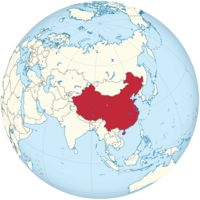

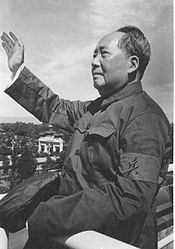
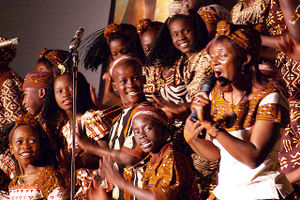
 KSF
KSF